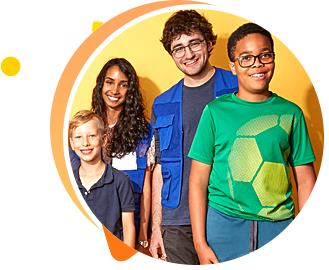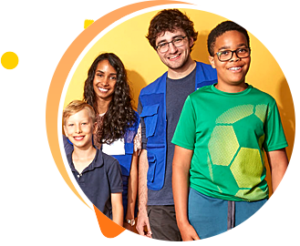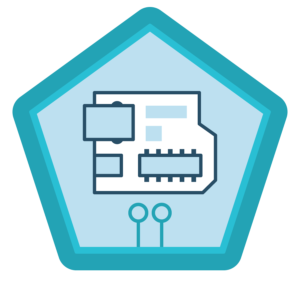Register for Weekly Programs:
Intermediate Robotics
MicroBit: With kids comfortable using the Makecode interface and a handful of projects under their belt, more fundamental robotic programming structures are tackled. Students work through things like variables, conditional statements, and more complicated loops, while each of the many different inputs the MicroBit comes with are explored (including the direct detection of voltage at pins). The last functionally looked at is radio communication which allows MicroBits to transfer data to one another resulting in some very cool wireless projects.
Arduino TinkerCAD: After covering conditional statements and a few other slightly more abstract coding tools like variables, the intermediate section moves through component after component teaching kids what they do, how they work, and then presenting projects that they can utilize them in. This includes things like potentiometers, ultrasonic sensors, light sensors, motors, and more. One of the most important “devices” covered early on is the serial monitor which allows the Arduino to communicate with the computer over USB and can be very important for debugging and calibration.
Kids learn core skills that get applied in projects to integrate their learning and make it fun. Some of the core skills learned and sample projects made include:
- MicroBit
- Variables (Keeping Track of Values)
- IF-THEN (with random and forever loops)
- Inputs 2 (reading sensors into variables)
- Project: Fortune Teller
- Project: Slide Whistle
- Project: Theremin Instrument
- While Loops (countdowns and sparkling)
- Project: Button Reaction Game
- Arduino
- Breadboards (wire all the things!)
- Project: A Million Lights
- Project: Trac Lights
- Project: Dual Trac Lights
- Project: Chevrons
- Random (Creating Random Numbers)
- Project: Random Robot Voices
- Project (Red Light – Green Light)
- USB/Serial Print (Text from a Robot)
- IF…THEN… (Adding Conditional Logic)
- Project: Screaming Robot Friend
- Project: Yes or No Fortune Teller
- Project: Doorbell
- Variables (Keeping Track of Values)
- Analog Read (Twisting Pot Dials)
- Project: DJ Scratch
- Project: Metronome
- Motors (Electricity Spins Magnets)
- Motors 2 (Transistors to power motors)
- Motors 3 (H-Bridges: Multiple motors)
- Ultrasonic (Sound Measuring Distance.)
- Project (Big Mouth Billy Bass)
- Servos (Fine Control Motors)
- Light Sensor (Detecting Light)
- Project (Theremin Musical Instrument)
- Project (Sustainable Lighting)
- Sound Threshold Mics (Detect Loudness)
- Project (How Long Can You Scream For?)
- Project (Too loud in here).
- Microphone Recorder (Recording Sound)
- RGB LEDS (Rainbow Coloured Lights)
- Project: Trac Lights 2 (Single Light)
- Project: Random Colours
- Project: Dial a colour
Skills Learned
MakerKids Mindset for Robotics: Confidence
Robotics involves a lot of technical skill and deep thinking. Concepts like circuitry can be tricky to work with. The best understanding comes from seeing things in action, and that requires first giving it a try.
In addition to the testing required for inquiry-based learning, with robots, there are countless reasons why something doesn’t work as intended. Having the self-confidence to experiment while working through a problem and trying new things to see which one works is an asset in all areas of life.
Class Details
1 hour or 2 hours
Choose between a 1 hour or 2 hour weekly timeslot
1:5 instructor:child ratio
1:5 instructor:child ratio or better
Project-based learning
A new project each week, allowing kids to join anytime. Projects combine foundational building blocks with new material, which teaches and reinforces concepts in new ways to learn by doing through project-based learning.
1-5+ years
Participants typically stay in this program for 1-5+ years.
Why Parents and Children Love MakerKids

Expert Facilitators
With a passion for youth and technology, our Maker Mentors recognize the uniqueness of your child and fosters their creative side and joy for STEM. Maker Mentors are trained to have students focus on the why and discover the logic behind the code instead of following a prescriptive set of instructions.

Engaging Curriculum
Weekly programs are built for all interests and experience levels. See the excitement in your child as they watch their work come to life. All classes include mini-lessons on internet safety and computer literacy so your child is better prepared to navigate the digital world.

Social Connections
With a 5 to 1 child to staff ratio and a focus on collaborative problem solving our classes are designed for your child to actively participate. Parents are amazed at how fast their child opens up socially, as they connect and build friendships with like-minded children.
Testimonial

“Our kids also enjoy learning a new coding language and I’ve watched my younger one who started off being a bit shy and unwilling to share online to make new friends and became one of the most talkative ones in class.”
– Debbie Fung
Success Story
Max, age 11
- After starting our program, Max taught a coding class at his school. Over a 10 week period, Max taught 60 different students after school, starting from grade 2.
- Max was a top four finalist for Best Game at his school’s street fair. He was even visited by the school district Vice President!


Meet An Instructor
Meet Ariel, One of Our Maker-Mentors
Certified Teacher with a Background in Early Childhood Education
Hello, my name is Ariel! I have worked for the YMCA, volunteered for day camps and had a number of placements in other learning spaces such as TDSB classrooms and the Boys and Girls Club. I completed my undergrad at Ryerson University where I studied Early Childhood Education. I most recently earned my Bachelors of Education at University of Ontario Institute of Technology where I graduated with the highest distinction. More simply put, I love learning.
Specialties: Teaching children with unique skills and abilities, meeting diverse learning needs and optimism!

